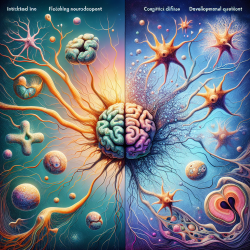Vascular dementia (VD) is the second most common form of dementia after Alzheimer's disease, affecting a significant portion of the aging population. While much is known about cognitive impairments in Alzheimer's, language impairments in VD remain less explored. Recent research provides crucial insights into these impairments, offering practitioners new ways to enhance their assessment and intervention strategies.
The Complexity of Vascular Dementia
VD arises from cerebrovascular damage and can manifest in various forms, including post-stroke VD and subcortical VD. Each subtype presents unique challenges, particularly concerning language abilities. Understanding these nuances is essential for accurate diagnosis and effective treatment.
Cognitive and Language Disorders in VD
The cognitive profile of VD is diverse due to the variability in vascular damage locations. Common cognitive disorders include bradyphrenia, memory impairment, and dysexecutive symptoms. Language impairments are often secondary to these cognitive deficits but are no less significant.
- Cortical VD: Often results from multiple infarcts affecting cortical regions, leading to executive function disorders and episodic memory issues.
- Post-Stroke VD: Cognitive profiles vary based on stroke characteristics, with strategic infarcts leading to specific language impairments.
- Subcortical VD: Characterized by psychomotor slowing and executive dysfunction, impacting language indirectly.
The Role of Speech-Language Assessment
An effective assessment strategy should consider the secondary nature of language impairments in VD. By focusing on executive functions and psychomotor speed, practitioners can better understand the underlying causes of language difficulties.
- Differential Diagnosis: Comparing performance on tasks with varying complexity helps identify executive contributions to language impairments.
- Error Analysis: Analyzing errors such as semantic paraphasias can reveal preserved lexical knowledge despite executive dysfunctions.
The Path Forward for Practitioners
This research underscores the importance of a comprehensive approach to diagnosing and treating language impairments in VD. Practitioners are encouraged to delve deeper into these findings to enhance their clinical practices further.










